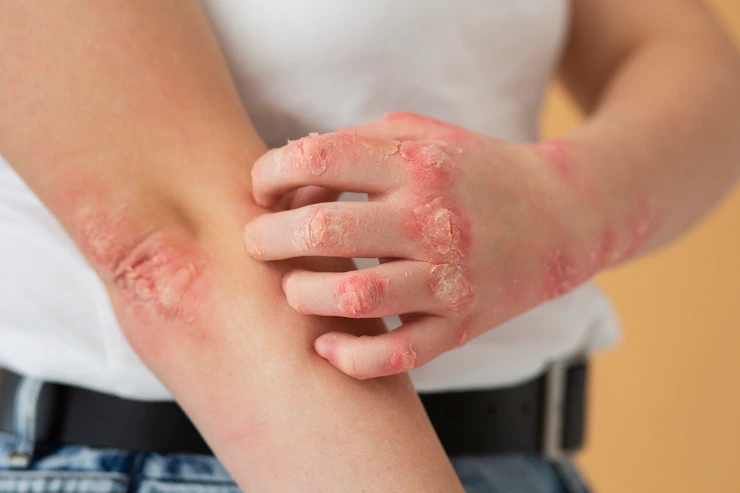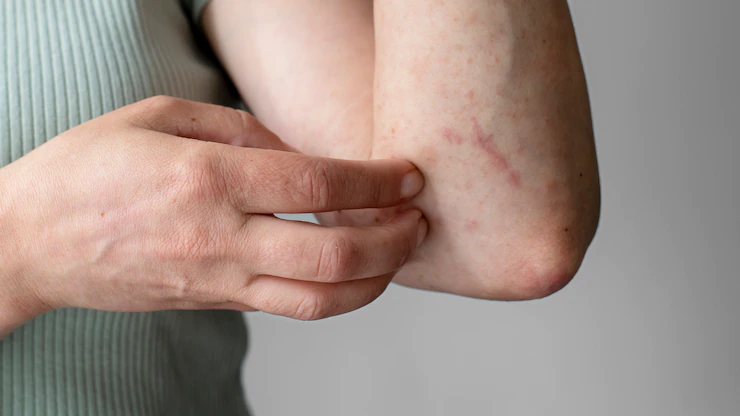Psoriasis Arthritis Causes, Symptoms & Treatment

Psoriasis sufferers are prone to experiencing Psoriatic Arthritis if they don’t take the necessary steps for treatment & manage their condition. Psoriasis is a skin condition marked by red patches & silvery scales on the skin and usually occurs before a patient is diagnosed with Psoriatic Arthritis. For certain individuals, issues in the joints can start to emerge even before physical signs like skin patches appear, or they might simultaneously show up.
Psoriatic arthritis is primarily identified by its associated joint pain, stiffness & swelling. It can occur in any part of the body including fingers and spine, and the severity of symptoms can vary from minor to extreme. Psoriatic flares & remissions, which characterize both psoriasis and psoriatic arthritis, often alternate with each other.
Psoriatic arthritis has no known remedy and therefore, therapeutic measures focus on minimizing symptoms and preventing joint deterioration. If neglected, this condition can be quite restrictive and stop you from leading a normal life.
Table of contents
What are the symptoms & treatment of psoriatic arthritis?
Psoriatic arthritis can bring about a variety of signs and symptoms, which can range from mild to severe. Generally, individuals tend to experience two or more of these symptoms in unison.
People with joint inflammation might experience: aching & stiffness in their joints, swelling of one or more joints, and increased pain after periods of rest that lasts for longer than half an hour.
Inflammatory arthritis is a condition that causes pain and swelling in the joints, which is due to inflammation in those areas. It can impact any joint, but the most common joints affected are those mentioned below.
What causes psoriatic arthritis?
The presence of certain genes inherited from your parents or grandparents can predispose you to develop psoriatic arthritis. Various triggers can cause inflammation to occur, ranging from stress, hormonal changes, and even illnesses. Inflammation can additionally be triggered by other factors like accidents, being overweight, and smoking.

When diagnosing the cause of a condition, a certain amount of guesswork is often necessary. Fortunately, psoriasis and psoriatic arthritis aren’t contagious, so you can be sure that you haven’t passed them on to anyone else.
Diagnosis & treatment for Psoriasis Arthritis
During your physical examination, your doctor may look for evidence of swelling or pain in your joints, examine the skin on your fingernails for abnormalities, and feel the bottom of your feet and heels to look out for any tenderness.
Psoriatic arthritis usually diagnose after a physical examination & other tests that can help to rule out any other possible causes of joint pain such as rheumatoid arthritis or gout. A single test cannot work for the diagnose of this condition, however, various methods are there to confirm it.
Imaging tests
- X-ray scans are in use to identify signs of psoriatic arthritis that are not present in other forms of arthritis. These images can help doctors pinpoint any changes in the joints.
- Magnetic Resonance Imaging (MRI) is a widely used imaging procedure. It employs radio waves and a powerful magnet to create images of the soft tissues and hard tissues in the human body. MRI scans can be conducted to examine issues with tendons, ligaments, lower back, and feet.
Laboratory tests
- Rheumatoid factor (RF). A blood test for this antibody is a useful tool for medical practitioners to distinguish between rheumatoid arthritis and psoriatic arthritis. It is usually found in the former but not generally in the latter. This testing can be beneficial in helping your doctor diagnose accurately.
- Your doctor may take a sample of joint fluid via needle to help diagnose whether you have gout or psoriatic arthritis, as uric acid crystals in your joint fluid can provide evidence for either of the two. It is also possible to suffer from both conditions simultaneously.
Psoriasis arthritis treatment
Unfortunately, there is no one-size-fits-all cure or treatment for psoriatic arthritis. The main goal of treatment is to control the inflammation in the affected joints, minimize joint pain & disability, and manage skin involvement. Prescription medications called disease-modifying antirheumatic drugs (DMARDs) are typically among the most common treatments available.
Depending on the intensity of your illness and which body parts it occures, the method of treatment varies. It could require some trial & error before identifying the cure that works best for you.
Medications
There are several psoriasis arthritis treatment & medications available for the management of psoriatic arthritis, including:
- People suffering from mild psoriatic arthritis can find relief with nonsteroidal anti-inflammatory drugs (NSAIDs). Over-the-counter medications like ibuprofen and naproxen sodium are some of the most common.
- Traditional disease-modifying antirheumatic drugs (DMARDs) can be effective in delaying the progress of psoriatic arthritis and preserving joint & tissue integrity.
- Methotrexate, leflunomide, and sulfasalazine are some of the top DMARDs (Disease Modifying Anti-Rheumatic Drugs). However, with their use can come certain risks. This includes liver damage, bone marrow suppression, and possible lung inflammation and fibrosis.
- DMARDs, commonly referred to as biologic agents or biologic response modifiers, are a type of medication that alters the body’s immune system pathways to stop inflammation and its associated symptoms. A wide range of biological agents such as Humira, Cimzia, Enbrel, Simponi, Remicade are available. While they are beneficial for treating conditions like rheumatoid arthritis and psoriasis, it’s important to note that these drugs have an increased risk of causing infections.
- Tofacitinib (Xeljanz) is a preferred option when conventional & biological DMARDs don’t prove to be effective. Although it up-regulates its effectiveness, higher doses of tofacitinib can result in serious pulmonary or cardiac events and cancer.
- Apremilast (Otezla), a newer oral medication, is effective in curbing inflammation within cells . It works by suppressing the activity of an enzyme in the body. Apremilast is the go-to treatment for individuals with mild to moderate psoriatic arthritis who choose not to take DMARDs or biologic agents. Although it may come with some adverse effects such as diarrhea, nausea, and headaches, these are usually manageable.
Therapies
Your doctor can refer you to physical and occupational therapies that may reduce your pain and make it easier to do daily activities. Additionally, massage therapy has to be effective in providing relief from pain.

psoriasis arthritis treatment: Surgery
Joint surgery due to psoriatic arthritis is rare except in cases where the tendons needs a repair. This may require surgical intervention.
After enduring many years of psoriatic arthritis, there may come a time when inflammation has damaged a particular joint to such an extent that joint replacement surgery may be the only solution.
If you have a serious case of psoriasis near any joint that requires surgery, your surgeon may suggest taking antibiotics to protect against infection.
It is not uncommon for psoriasis to emerge on a scar resulting from surgery; however, it is managable using conventional methods.
Takeaway
Living with psoriatic arthritis can bring forth some difficulties in the workplace. However, if the appropriate medication and psoriasis arthritis treatment is taken, one can certainly carry on with their job. If you’re feeling down, it’s important to remember that you are not alone. Help and support are available, so don’t hesitate to reach out. You deserve to be treated with respect and have rights & options.
Products That We Suggest for you
Revitol Dermasis Psoriasis Cream – No More Itching, Flaking
Stop the flaking, Stop the itching, Stop the redness and irritation! Revitol’s engineers have created the ultimate solution for Psoriasis sufferers. With a unique and creative blend of nature’s most powerful and soothing ingredients, users are experiencing fast and effective relief of even the most stubborn Psoriasis symptoms.
To know more and purchase, Click Here








Comment to this Article
Comments that encourage respectful conversation are welcomed at AGP Health n Beauty. Stay on subject, please. Comments that are aggressively promotional of goods or services or that include personal attacks, vulgar language, or other forms of abuse will be deleted. Which remarks break our comment policy will be decided at our discretion. (Anonymous comments are accepted; just leave out your name in the comment box. Although necessary, your email address won't be posted with your comment.)